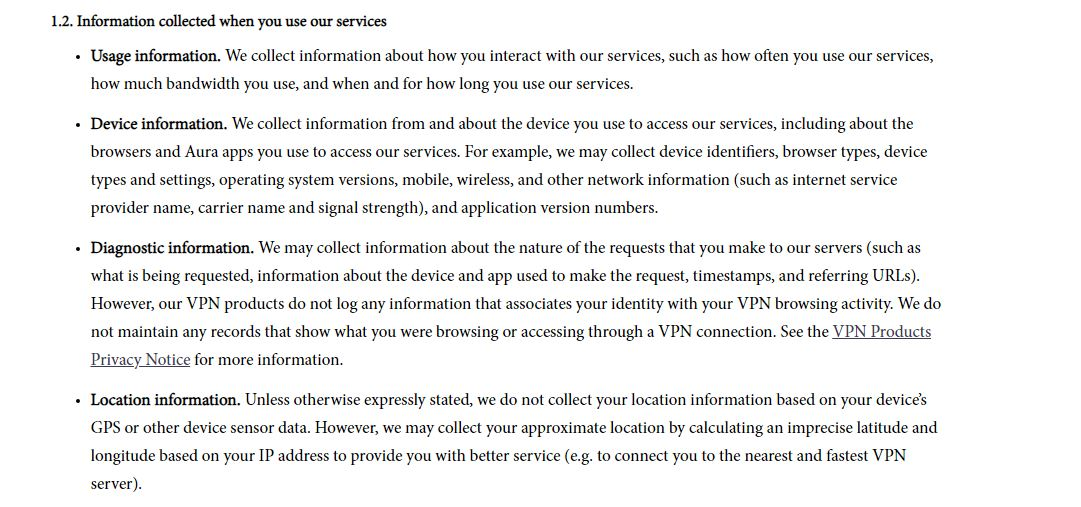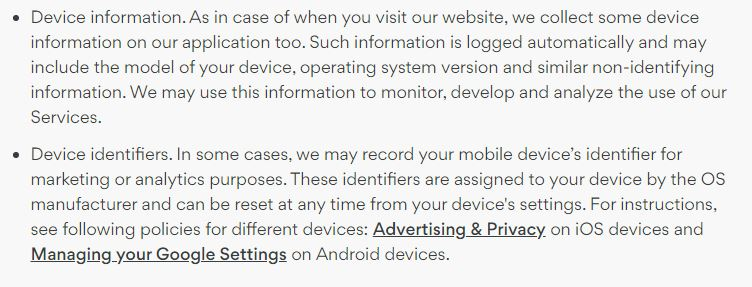Jaysu
Banned
- Joined
- 21.09.20
- Messages
- 122
- Reaction score
- 838
- Points
- 63
Is it true that VPN does not collect any information about you?
What about your device data? If this is true, then you should understand what kind of information VPN services write in their logs. To be honest, this is a pretty interesting topic. There are many articles on the Internet that talk about which magazines are created by VPN services. However, little is said about exactly what data about your device is being tracked by VPN providers.It is worth noting that this article will not talk about unscrupulous VPN services that keep logs of websites visited by customers, we will only talk about data related to your device.
What kind of user information does a VPN collect?
Most often, this is data that helps VPN providers improve their service and allows them to analyze the work done. Some VPNs may collect more data about you than others. However, in general, providers collect the following information about your device:- operating system;
- device identifier;
- phone model;
- what browsers and applications are you using.
For example: Here's what information Hotspot Shield collects about your device. These are device ID, phone model, operating system version, language settings, and network data.
See the attached image below.

NordVPN collects detailed information about your device: OS version, phone model, device ID (see the attached image below).

We also reviewed StrongVPN's Privacy Policy, but did not find any specific information about the data collected there. Therefore, we had to contact the company's support. StrongVPN collects detailed information about the OS version and device ID, according to its representatives. This applies to both Android and iOS.
Thus, you can be sure that the VPN collects information about your device. However, you shouldn't worry too much about this, as this is not the kind of data that can reveal your identity.
Does a VPN that doesn't generate logs also collect information about the user's device?
Yes it is. Above, you have already met two VPNs (StrongVPN and NordVPN) that do not create logs, but collect data about their users' devices. Hotspot Shield also does not record a person's personal data, but creates a log associated with their IP address.If you're looking for another VPN example, then it's time to check out CyberGhost's Privacy Policy. They have a huge list of device-related data that they collect. It includes the version of the operating system, language settings, date and time, battery power.
If the VPN does not generate logs, this does not mean that it does not collect information about your device.
Why does VPN collect information about your device?
Some of you have probably already answered this question in your head before - he does this in order to sell your data to advertisers, right?Of course, if the Privacy Policy does not prevent the company from sharing your personal data with third parties, then you are completely right. However, most VPNs do not store logs. It is clear from their privacy policies that they do not share your device information with anyone.
Then why do they need this information?
Why does a VPN need your device data? More often than not, they help the VPN troubleshoot and analyze its performance.Diagnostics
If you have any problems with the VPN application, your service provider can solve them much faster if they already have access to your device data. He will not need to waste time trying to find out parameters such as your device model and operating system version.A huge amount of data on different devices of users helps providers quickly troubleshoot and improve their service for specific platforms.
Analytics
Basically, device data helps VPN providers know user preferences.For example, they understand which operating systems are used more often by their customers. With this information, providers are able to focus their efforts on optimizing applications for these operating systems in the first place (since this is where most of their user base is located).
For another example, let's say a vendor has just added a "kill switch" feature to their Windows application. Using the device data, he can roughly understand how many customers are using this feature. If it is very popular, the provider may start thinking about adding this feature to other platforms (for example, for iOS and Android).
In addition, analytics helps service providers to conduct more targeted marketing campaigns. Of course, there is no direct benefit to the customer. Consider this, though: If the VPN provider's marketing campaigns are successful, the app will have more users. In turn, this will help the service provider expand its capabilities (develop new applications, create more servers, increase the number of supported protocols)
Thus, the data about your device helps the provider to improve their service and expand the list of services.
Can you limit the amount of device information a VPN collects?
Yes, but not fully.First, let's talk about data collection by a VPN application. You can prevent him from collecting personal information about you in the settings, or simply delete this application.
Unfortunately, if you can't change the app's settings or aren't ready to stop using a VPN, your only option is to use a different device every time you need it. If you don't have a huge heap of smartphones, laptops and PCs at home, then this method will not work for you. However, if, for example, data is collected only about your operating system, you can use special software to emulate a virtual operating system.
Below are also some helpful tips to help you limit the amount of data the VPN collects about you:
- Use Firefox or Brave with appropriate privacy settings.
- Use Tor browser, but disable its VPN.
- Install extensions to protect your fingerprints from being memorized (extensions such as Chameleon or Trace).
- Disable Flash in your browser.
- Disable JavaScript in your browser. Please be aware that some sites will have limited functionality.
- Use a virtual machine (such as VMware Workstation Player or VirtualBox).

